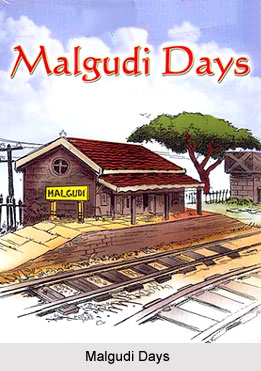 Malgudi Days is the collection of some short stories set at the backdrop of the author`s make-believe village Malgudi. This is the place where all of Narayan`s characters were living their life in a friendly manner. The title of the book aptly depicts the meaning as the stories are all about the life style in Malgudi. The different character, each having their personal life as well as village community really takes the reader at that scenario which is only possible by such great author like R. K. Narayan.
Malgudi Days is the collection of some short stories set at the backdrop of the author`s make-believe village Malgudi. This is the place where all of Narayan`s characters were living their life in a friendly manner. The title of the book aptly depicts the meaning as the stories are all about the life style in Malgudi. The different character, each having their personal life as well as village community really takes the reader at that scenario which is only possible by such great author like R. K. Narayan.
The author R. K. Narayan is the best at his work. He created a lot of stories in a very lucid and transparent manner. Among which the Malgudi Days is the most famous collection. He began his career with writing short stories, which were appeared mostly in The Hindu and also worked for some time as the Mysore correspondent for Justice, which was a Madras-based newspaper. His first work `Swami and Friends` was delayed for lack of publishing support. Graham Greene, through his mutual friend, was so much moved by Narayan`s new work and he supported it for publishing through monitory support as well as other guidance. After this novel, a stream of novels based on Malgudi flourished one after another. In 1980, R. K. Narayan was awarded the A. C. Benson award by the Royal Society of Literature and was made an Honorary Member of the American Academy and Institute of Arts and Letters. In 1989 he was made a member of the Rajya Sabha (the non-elective House of Parliament in India). He received the Sahitya Akademi Award for The Guide on 1958.
Synopsis:
`Malgudi Days` is a collection of short stories that comprises of three stories. `Swami and Friends` is a story well loved by almost everyone. This book basically goes into the details of swami`s childhood and his friendship with Rajam and Mani. These three were inseparable. This was created in pre-independence era and it`s really funny as well as touchy to see swami and his classmate`s reactions to a riot, which takes place outside his school, protesting about the British Raj. But most of the ambience that narayan creates is so fluid and perfect, that anyone can swept away without having any knowledge of it. Then came the `The bachelor of Art`. This is about Chandran who is confused about as to what is his true purpose in life. We are swept along with him on his journeys of self-revelation with captivation. It`s really amazing how the human mind can absorb emotions and translate them into something else. The whole story is about Chandran finding out whether he is in love with the lady whom he professes to love or not. The third story is really fascinating. It`s about Jagan and his son Mali. It shows the struggle between the generations, i.e. the generation gap that exists between parents and children. All these stories are really enchanting and leave the reader with a good mood after finishing the book.
This collection of short stories being published by Bt Bound, William Heinemann, Viking Press, and Penguin Classics truly signifies the lifestyle of the people of Malgudi.
Malgudi Days later collection was published on 1975. And it draws from two earlier collections and includes some New Stories. They are really short and sometimes are just three pages. They are very crisply plotted. Some of the better stories seem almost like textbook examples of how to write a memorable short story in five hundred words or less. There is a kind of elemental pleasure in reading these stories in close succession, and watching Narayan people his world with tragic shopkeepers, ethical pickpockets, mean beggars, storytellers, anxious college students, and of course, `The Talkative Man`. For Narayan, storytelling is deeply concerned with establishing a sense of community, of people completely involved in each other.













